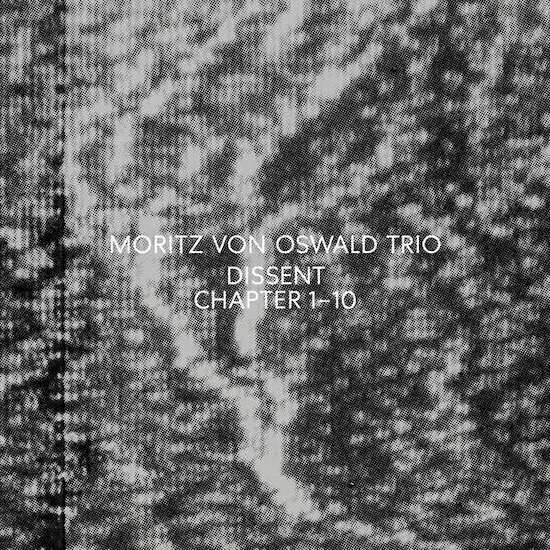More than five years on from their last release Moritz Von Oswald convenes a new version of his Trio. He’s now joined by electronic explorer Laurel Halo and renowned jazz drummer Heinrich Köbberling. They set out onto the abstract terrain beyond minimal techno, jazz, and avant-ambient electronics. It’s all changing skies and shifting sands. It doesn’t hook or repel; it absorbs, waiting for you to sink in to it. This is music as sound field, more cerebral than physical, a space for your mind to wander. Edited down from Berlin sessions in late 2020, Dissent still runs an hour and a quarter, von Oswald always did like to stretch right on out.
The tracks are presented as ten chapters book-ended by a preface and an epilogue, a device which suggests some form of narrative, of which the music offers only faint traces. They leave a lot of room for the listener to complete the work. A choose your own adventure where we stay safely this side of the page, sipping our coffee. Why ‘Dissent’? There doesn’t seem to be much of it expressed outwardly by the music and still less between them in their playing. They gently layer their contributions, subtly supporting or contrasting one another. No-one would be so gauche as to solo, never mind showboat. The monochrome cover is a close up shot of a billboard, focussing in on the small elements that build the bigger picture.
Still, the outline of a story or journey slowly appears. Is the sound getting richer as you go, or are you just sinking deeper into it? The first twenty minutes seem almost determined not to impose but as ‘Chapter 4’ coheres around a steady metronome and a pleasing noir mood, the game is afoot. Sadly the nadir is hard at its heels, ‘Chapter 5’ brings nauseous smug-house flashbacks to ‘Rose Rouge’ and other less palatable entanglements of the jazz and dance worlds. Your mileage may vary but for me the second half of the album contains the better music.
The deep pulse of ‘Chapter 6’ steadies the ship and from here on out it’s fine. ‘Chapter 7’ starts in rainforest insect buzz and all elements expand in the heat, stepping closer, becoming louder and more colourful. Electric piano scrawls over the loose limbed groove of ‘Chapter 9’ bringing a warm 70s vibe that slowly overheats Köbberling’s funky drumming, pushing the track towards a chaos it just holds at bay. The lengthy final chapter leans back in the aftermath, dazed and humid keys floating over scattered, dubbed rhythms. ‘Epilogue’ is not the drifting atmospheric coda you might expect but a cheeky three-minute floor-filler, all club bumps and de-tuned synth daubs. A quick closing nod to von Oswald’s roots.
Dissent is like a constantly reconfiguring cityscape (Berlin, perhaps). It feels at a remove, behind glass. The view from a tower or the back of a cab. Any dissent is cordial, calm prevails but the music never really relaxes, a tension underpins it. A subconscious squeeze on your spine. It’s always hovering at the edge, dancing along the border between nothing and locking into a pattern. Fracture and flow. An exhibition of abstract paintings effacing the grid in cool tones. A pan-European thriller in which our hero remains unruffled. The press shots find them smartly dressed but ill at ease before the lens, like an awkward family gathering, or the staff of a small but prestigious gallery, Moritz sporting an extravagant cravat, every inch the elegant facilitator.




